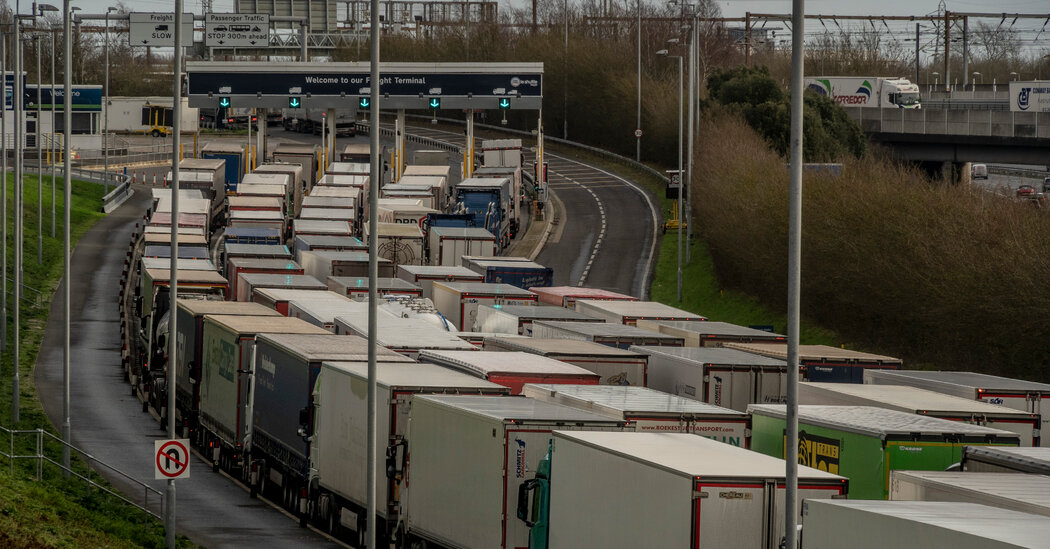Boris Johnson has been forced to relinquish leadership of the country during a perilous economic moment, with a grim prospect and an uncertain Brexit legacy behind him.
On Thursday afternoon, Mr Johnson described his resistance to stepping down “when the economic situation is so difficult”.
It has become a period often compared to the 1970s in Britain, an era of stagflation when the economy shrank and inflation rose and vital services were halted by widespread strikes. Britain is not yet repeating this stagflationary era, but the threat is there.
Inflation in the country has reached an annual rate of 9.1 percent, the highest in four decades, driven by supply chain disruptions caused by pandemic lockdowns and the war in Ukraine. And price pressures continue to mount as companies begin to pass on the rise in costs to their customers and workers demand higher wages to cope with the rising cost of living.
Households face the heaviest pressure on their living standards in generations as wage growth fails to keep up with inflation, which is not expected to peak until at least the decline, when the price cap on household energy bills is set higher. Disposable household income, after adjustment for inflation, is expected to fall by more than 2 percent this year.
That’s the worst since 1945, according to Oxford Economics.
“It’s a really tough time for a lot of people,” said Andrew Goodwin, the UK’s chief economist at Oxford Economics. For low-income households, “it gets worse because the kinds of things you spend more on – food, gas, energy – are the things that increase in price the fastest. So their inflation rates will be even higher.”
With wages lagging far behind inflation, workers have declared strikes that prepared Britain for a summer of labor unrest. Recently, train crews and criminal defense lawyers have quit their jobs, and health workers, educators and postal workers are among those threatening to go on strike in the coming months.
The unrest and anger reflect the pain that many households feel. Johnson and his former chancellor, Rishi Sunak, who stepped down on Tuesday, sought to ease some of this burden in May when they announced a new round of cost-of-living payments and bill cuts. But hardships were already rife for lower-income households, who were unable to build up savings during the pandemic. Food bank use had increased during the pandemic, even before the last rise in inflation.
Mr Johnson’s departure creates significant uncertainty about the government’s next steps to address the economic adversity. It could delay the implementation of the next budget, which will determine spending and tax decisions. For investors and economic analysts, the crucial question is what the future of fiscal policy holds and whether a new chancellor, Britain’s top finance minister, will reverse the last chancellor’s tax hike for many workers.
While many of the economic shocks now hitting Britain, such as the rise in energy prices, are shared with other countries, the outlook for Britain is particularly challenging.
“These shocks reveal deep-seated problems that have been around for a while and make the economy much more precarious than it would otherwise be,” said Jagjit S. Chadha, director of the National Institute of Economic and Social Research.
The research institute expects little economic growth in Britain this year and next, exacerbating a long-standing problem of unequal wealth and income distribution. At the same time, Mr Chadha said Brexit has been a “slow breakthrough” for the UK economy, which has held back growth as trade barriers have been erected, European Union citizens have left the labor market and policy uncertainty has discouraged business investment.
“This is not a very attractive painting that I am painting,” said Mr. Chadha. “But this is the legacy of whoever becomes the next prime minister and the cabinet that comes along.”
Frequently asked questions about inflation
What is inflation? Inflation is a loss of purchasing power over time, meaning your dollar won’t go as far tomorrow as it did today. It is usually expressed as the annual price change for everyday goods and services such as food, furniture, clothing, transportation, and toys.
Andrew Bailey, the governor of the Bank of England, said last month that the UK economy was “probably weakening earlier and slightly more than others”.
To fight inflation, the central bank has raised interest rates since December, bringing them to the highest level since 2009. Further increases have become more uncertain as policymakers try to strike a balance between curbing inflation and the risk of a recession. Oxford Economics predicts that the British economy will stagnate in the coming year.
Mr Johnson’s economic agenda was a pitch to ‘level up’ the country in a grand plan to reduce regional inequality. But for many analysts, the plan has failed due to its lack of specificity. His oft-cited drive to build a “high-paying, highly-skilled, high-productivity economy” was expressed in words, but not policy action, they said.
“Certainly there are some good slogans, but not huge achievements behind them,” said Mr. Goodwin. “A lot of these kinds of policies, they were ideas, nothing followed. There was no delivery mechanism.”
One of Mr Johnson’s proudest achievements was “getting Brexit done”. But if that As the process in Ireland is still mired in conflict, Mr Johnson’s Brexit legacy is uncertain as the economic benefits of leaving the European Union are slow to manifest.
For many industries, including agriculture, construction and hospitality, the legacy of Brexit is a smaller workforce that causes businesses to slow down. For small businesses exporting to the European Union, Brexit has created additional costs and bureaucracy with no discernible benefits. Trade barriers have also exacerbated food inflation, economists say.
“We have a world where technically we have left the European Union, but we have not replaced it with the kind of trade agreements that would have fostered better growth than it otherwise would have,” said Mr Chadha. “We don’t really have ‘Brexit’ the way people said we would have.”

